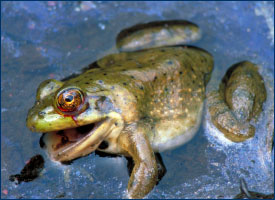Conservation Progress Lack
The Attenuation of the Biological World — Part 1
Lack of Conservation Progress
At the present time (mid-2010) Homo sapiens are trapped in the paralysis-through-analysis syndrome: vast amounts of information but the inability to collectively change the outcome of seemingly unceasing bad news raining down upon all creatures great and small with relentless insults and calamity. Every day we are confronted with age-old quandaries, from feeding ourselves and assuring a quality of life for our loved ones, caring for our companion animals, watering our flower gardens, making ends meet, and — for many — questioning whether there is, in fact, some sort of higher power pre-determining the outcome of all these tests of our character as a species; a God who would permit Holocausts, genocides, seemingly random acts of mayhem and cruelty on vast scales.
 Gripping storylines ripped from the newsstands and thousands of television and radio channels, not to mention Internet media escalate with a rapaciousness throughout the world, 24/7, inviting a collaboration in the ultimate voyeurism — computer cartography that yields imagery of your life and that of everyone else’s. In London, with its Internet Protocol surveillance cameras — an estimated 10,000 devices — has more than confirmed the fears raised by George Orwell about Big Brother. While in places like Mexico City, rifle-toting guards at every street corner engender a sense of a war zone.
Gripping storylines ripped from the newsstands and thousands of television and radio channels, not to mention Internet media escalate with a rapaciousness throughout the world, 24/7, inviting a collaboration in the ultimate voyeurism — computer cartography that yields imagery of your life and that of everyone else’s. In London, with its Internet Protocol surveillance cameras — an estimated 10,000 devices — has more than confirmed the fears raised by George Orwell about Big Brother. While in places like Mexico City, rifle-toting guards at every street corner engender a sense of a war zone.
The war zones have also invaded the last remaining Green Zones, enabling those with access to proprietary satellite data to inventory each and every 90-pound or heavier Emperor Penguin in the name of science. The purpose of such inventories is to better gauge the success (or lack thereof) of their fertility, distribution, density, caloric intake, genetics and recruitment capacities. But such inventories are also invasions of privacy. In places like Amboseli National Park in Kenya, so-called eco-tourist guides driving big land cruisers filled with paying customers bearing their shotgun-sized long-lenses and hounding by their chatter, camera flashes, and motor-drives, the actual probability of successful propagation of lions is severely compromised. Other problematic eco-tourism data has been tallied with respect to Bottle-Nosed Dolphins in Doubtful Sound in relation to the number of tourist visitations throughout New Zealand’s Fiordland National Park.
Far more troubling, of course, are the oil spills, the road building into previously wild equatorial forest biomes, new legislation in country after country lessening the restrictions on resource extraction, the break-down in greenhouse gas emissions consensus amongst signatories to Kyoto, the continued increase in unmonitored chemicals entering the food, air, soil and water, and the rapidity with which our sole species is predicating the Sixth Extinction Spasm in the 4.2 billion year old annals of biology here on Earth.
Part 2: Biodiversity in Crisis: Loss of Sustainability
Comments Off
